Educating Northants 2021: Replete with #RoleModels
- Claire Green
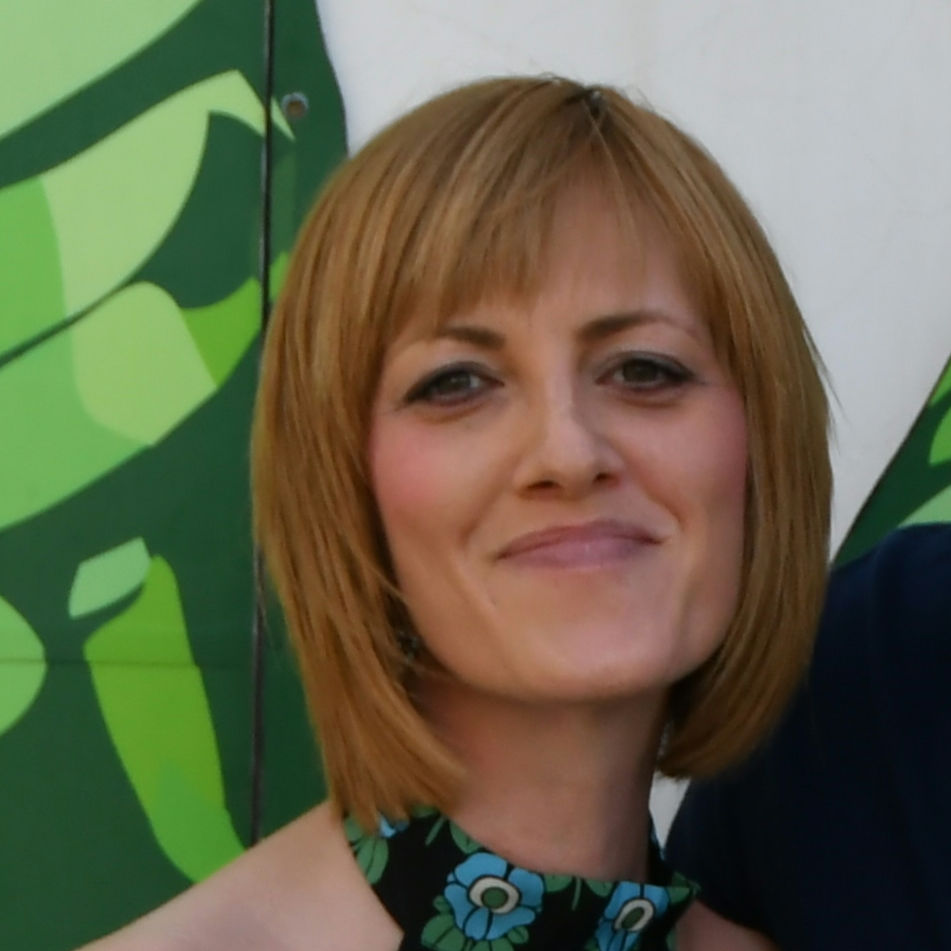
- Mar 29, 2021
- 7 min read
Having written a few blog posts about my belief that sixth form students should be seen as role models, I took the opportunity of presenting my thoughts at Educating Northants, an online conference bringing together educators across the county and beyond to share practice in order to bring about positive changes in all phases of education.
I am writing this post having spent two days – the first two days of the Easter holidays – watching as many of the 80+ sessions as I could digest in my end-of-term-tired state. I am totally overwhelmed by the level of talent and generosity within the contributions to this event. The wealth of knowledge, expertise and, most importantly, care shown by the organisers of and contributors to this event is truly inspiring. That I have spent two days of holiday time at the end of an exhausting term so engrossed is testament to the quality of this event. The Northants community – educators, students and parents – are better off for this conference; thank you to Carly Waterman, Cristina Taboada-Naya, Jay Davenport, Jennie Giovanelli and Esther Gray for organising it…#RoleModels of leadership!
I have reflected on my learning from the conference and selected some of the many sessions from the line-up that really resonated with me; both in terms of my philosophy on leading in the sixth form and the sort of culture I believe should be cultivated in our schools if we are to see the very best outcomes (and I don’t just mean in terms of exam results) for our young people. I actually watched so many more sessions than those I mention here so I am in no way suggesting those I have not included are inferior; they are all fantastic!!
Our young people as #RoleModels
The fact that Educating Northants 2021 began with a performance by Silhouette Youth Theatre set the tone for the day. A truly fantastic and moving performance of a medley of songs which left all watching in no doubt that the conference had young people at its very core. This beautifully arranged performance, combined with the inclusion of Nefe and Kamron - students from Lodge Park Academy and Kingsthorpe College - on the live panels, demonstrates the organisers’ commitment to holding the views of our young people at the heart of our approach. Nefe and Kamron spoke so eloquently about the challenges of the last year and about their gratitude for the provision they received. Even when Kamron’s microphone failed him, he remained unfazed and agreed to record an interview with his Headteacher so that nobody missed out on what he had to say… #RoleModels.

There were a few presentations that struck me as really resonating with the idea of young people as role models. Christian Mba’s excellent session ‘The Power of Potential’ asks us to consider why we came into education as professionals if we are not committed to eliciting the potential in our young people. Christian uses excellent film clips, personal testimony and snippets of research to support his inspiring message that we have a duty to unleash the potential in our young people. He argues that we must make the most of our own potential (and responsibility) as educators in order to best serve our students. As Christian says in his final message: “…Let’s never underestimate the power of potential we have in ourselves, our school communities but, most importantly, our young people.” Inspirational stuff.
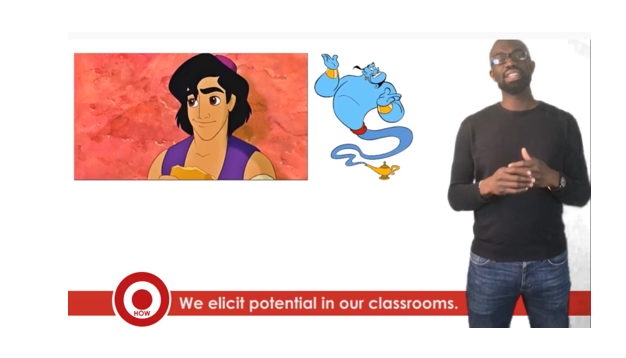
The format of the Educating Northants conference this year means it is possible to ‘dip into’ sessions then come back to them at a later date. This, alongside the fact that all of the sessions are short, bite-sized chunks, means we are able to benefit from a wealth of professional learning in a short period of time: genius! Two of the ‘Two Minute Tips’ I found to be really powerful were those from Matt Coleman and Natasha Barstow. Matt’s session on ‘Removing the armour – allowing our young people to truly be seen’ focuses on how we as educators can remove our students’ barriers to success by forging relationships that allow them to shine as young people. That Matt suggests this is necessary and applicable to all phases of education is key and is exactly what Christian was referring to in his presentation. Natasha’s tip was based on her drive to inculcate a culture of gratitude among her year group through her #AttitudetoGratitude initiative. I can absolutely see that the simplicity of asking students to nominate peers, staff or family members to receive a message of thanks and then sharing these with those nominated has instant power and impact. Inviting the nominations from the students themselves sends a message that their judgements about what or who holds value is seen as valuable by the school; so much so that their Head of Year is interested enough to ensure the recipient gets to hear it. This is definitely an idea I will be ‘magpieing’; thanks Natasha!
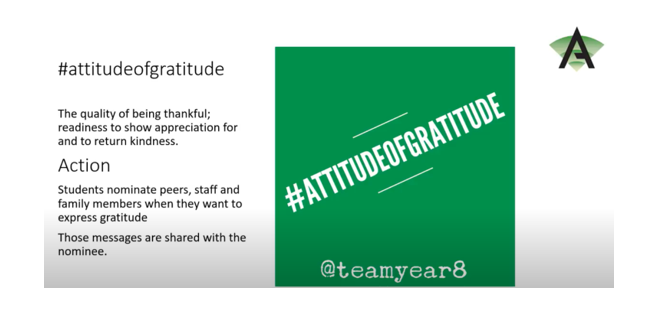
Leading a culture which allows for role-modelling
There were so many excellent sessions on leadership that I struggled to narrow down my thoughts in regards to role-modelling, but in the end, I have isolated four sessions. Carly Waterman’s thoroughly engaging session (love the use of the bell to demote mentions of research!), ‘Everything you need to know to be a headteacher’ and Nick Hart’s on ‘Codifying Culture – some things leaders should know for great cultural leadership’ both draw on the same research from Bereiter and Scardamelia (1993/2006) to discuss the need for leaders to be experts and the power of different forms of knowledge (both knowledge deliberately sought through research and that gained through experience) to create sustainable and authentic cultures. Carly’s clear passion for authentic, expert leadership shines through and Nick’s discussion of how to establish purpose is clear and applicable to all settings.

This idea of authenticity is evident in other presentations too – Jennie Giovanelli’s ‘What’s your story?’ session elevates the status of our students by acknowledging their contributions to our curricula. Jennie describes effective teaching and school leadership as providing “meaningful encounters” and not “…dismiss[ing our students] as empty vessels just to be filled or ignor[ing] the great diversity and richness that they bring…” This notion of ensuring our students’ contexts are represented authentically in the school experience we deliver is one that I absolutely support and endeavour to achieve within the sixth form that I lead. Jennie’s call for us all to “Be a voice not an echo” is one that chimed so much for me in terms of trying to create a culture in which our students see themselves as role models. If we can get our students to see that we value their experiences and views, we can unlock the potential in them in a much more powerful way.
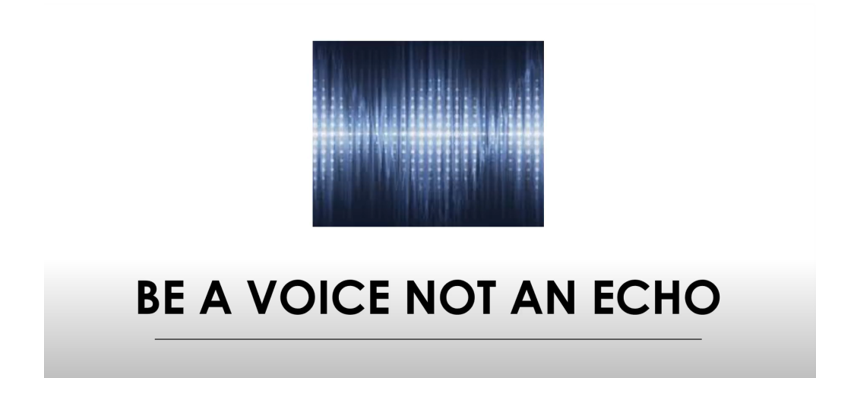
This ‘human’ approach to leadership is also evident in Lisa Pruden’s superb session on ‘How to Build a True Wellbeing Culture (TWC)’. Lisa takes us through a step by step approach to creating a school culture with wellbeing – for both staff and students – at its heart. I particularly like the first step outlined below about leaders needing to ‘check ourselves’ and decide who are our ambassadors for supporting a culture with wellbeing at its core alongside consideration of whether we, as leaders, model a healthy approach to our professional lives. Lisa suggests “it is important that we show humanity and give validation to the people that we work with AND the young people that we care about to say, ‘It’s ok to feel this way, and sometimes we all struggle’”; i.e. we role model a healthy, self-aware approach for our students. This in turn, will mean we can have honest and authentic conversations with young people about any barriers to their success in this regard; exactly what Matt Coleman was referring to in his session mentioned previously.
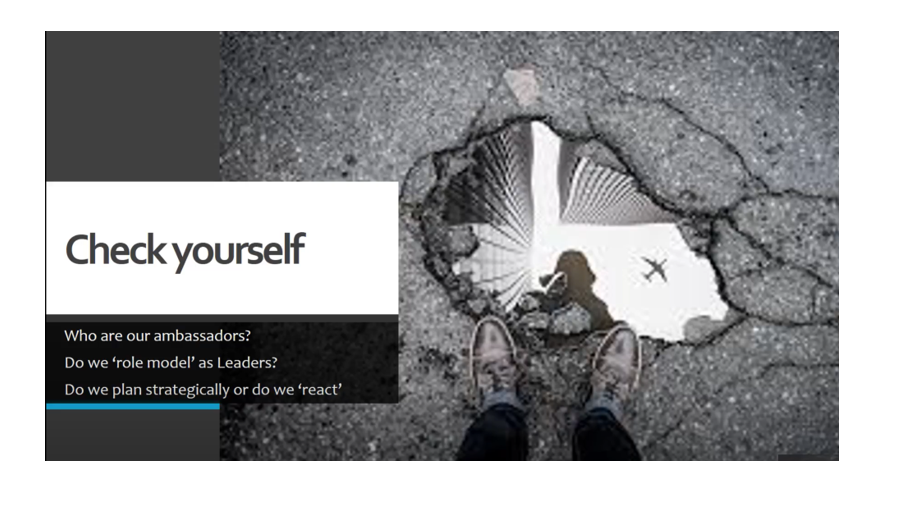
Post-16 take-aways
I was pleased to see a few sessions specifically focussed on 16-19 education within the #EN21 line-up and wanted to reflect briefly on two that I will definitely be re-visiting. The first of these is Adam Chapman’s session on ‘Using social media as a tool to engage learning in Further and Higher Education’. Adam argues that embracing social media can not only help with marketing (something I have seen to be really successful in my own setting this year), but can help our students to develop employability skills and allow them to become more ‘work-ready’. Adam also outlines an approach taken to teaching, using Twitter, Menti-Wordcloud, Tweetbeam and Wakelet to create virtual workspaces showcasing student and staff involvement in a particular theme or initiative via use of a chosen hashtag. This is certainly something that I would love to explore further, as we know our students are ever-more engaged with their online identities and behaviour and so utilising this approach in our teaching or leadership seems wise (as long as we have sensible safeguards in place of course).
Briony de-Wit’s session on ‘Supporting success at post-16 – a focus on data informed support cycles’ was a must-watch for me. Improving outcomes for our students is something every sixth form leader should take an interest in and so Briony’s clear explanation of how data points are used to create targeted support programmes of mentoring was of definite interest. The idea of naming the approach ‘support cycles’ rather than an ‘intervention’ programme sends a message to staff and students that the process should be seen as a positive one and not a punitive measure. The process of cross-referencing effort against progress allows for very targeted responses to student underperformance and I have already been in contact with Briony to discuss this further! That we were able to connect instantly through the conference means we can both benefit from our shared knowledge and expertise moving forwards; something that we have only done because of our involvement with #EN21.
One of the key take-aways for me from this conference has been that it has revealed a wealth of expertise, talent, knowledge, and above all, care for our young people. There are so many common strands running through the presentations that it is clear that those involved have shared values and a genuine desire to improve life chances for our young people; something I’m sure most of us came into education to achieve.
A celebratory finale
I am pleased that the final session I chose to watch (in my first ‘sitting’ anyway!) was Megan Morris’ joyous tribute to teachers, ‘The Real Royal Family and why Hello Magazine are Looking in the Wrong Place’. Megan passionately and eloquently argues that educators should be held in the highest esteem as experts in their field. She suggests that professionals within education should celebrate our peers and be given time “to revel in our pedagogy”. I couldn’t agree more.

Megan rightly suggests that Educating Northants allows us to do exactly that; like I said, replete with #RoleModels.
Further information about Educating Northants
YouTube Channel for the Educating Northants 2021 Conference: https://www.youtube.com/channel/UCDJgO-flPBf3OsVDe-ChB9Q/videos



Comments